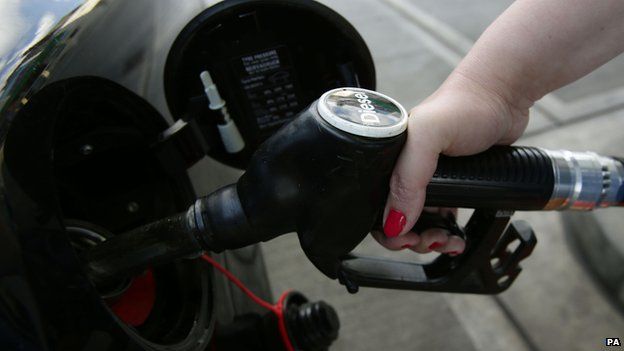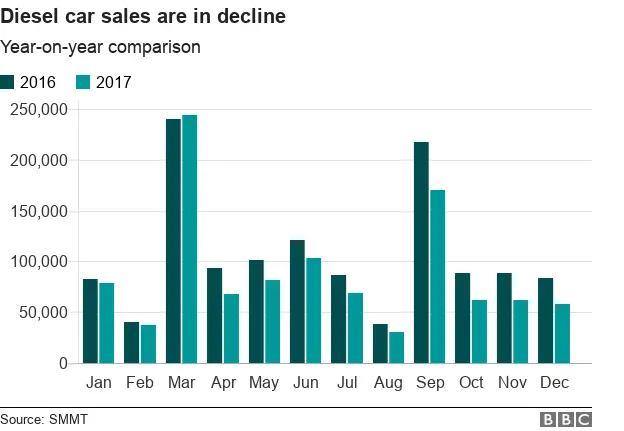Diesel car sales to plunge again this year, study warns
 PA
PAThe worst is yet to come for diesel cars which will see their sales continue to plunge, a study has warned.
Aston University predicts they will account for just 15% of the UK market by 2025, down from a 50% peak.
Automotive expert Professor David Bailey said diesel's "slow death" was being driven by "environmental pressures and consumer confusion" .
He is urging the government to set up a scrappage scheme to encourage drivers to switch to electric cars.
"The time is right for the government to take the initiative and offer up scrappage benefits to those who are prepared to ditch their diesels and switch to electric cars," he said.
The latest figures from industry body the Society of Motor Manufacturers and Traders (SMMT) showed sales of new diesel cars fell 17.1% last year as higher taxes and pollution fears hit demand.
Aston University expects a further 10% drop in sales this year and says diesel will account for less than a third of the market by 2020.

Analysis: Theo Leggett, business correspondent
Diesels have an image problem. The production of high levels of NOx emissions has made them the target of clean air campaigners.
The industry argues that the latest generation of diesels is much cleaner than its predecessors. Diesel engines also produce less carbon dioxide - one of the main gases associated with climate change - than petrol equivalents.
But that message isn't getting through. People within the industry blame anti-diesel rhetoric from the government, which they say has left people confused and worried. To put it bluntly, too many people think if they buy diesels, they'll face tax rises, bans from city centres, or both.
Diesels still account for four in every 10 new cars sold. But demand is falling rapidly. If they are to have a future, then the public and political perception of them will have to change, and change quickly.

The SMMT said confusion about the future of diesel had fuelled a backlash against the cars.
Diesel vehicles produce most of the nitrogen oxide gas coming from roadside sources, leading to their being targeted by clean-air campaigners.

But the cars are also generally more fuel-efficient than petrol cars and therefore produce less carbon dioxide.
That helps car companies to meet targets for reducing CO2, introduced to combat climate change.
The VW scandal - which showed how many diesel cars, which had passed official tests, were routinely producing much higher levels of toxic emissions when driven on the roads - exacerbated a backlash against the fuel.
Higher taxes have also hit demand.
Diesel car sales fell by almost a third in December after November's Budget which introduced a levy on new diesel cars that failed to meet the latest emissions standards.
Experts said the one-off tax increase - which comes into effect in April - would be applied to most new diesels.
